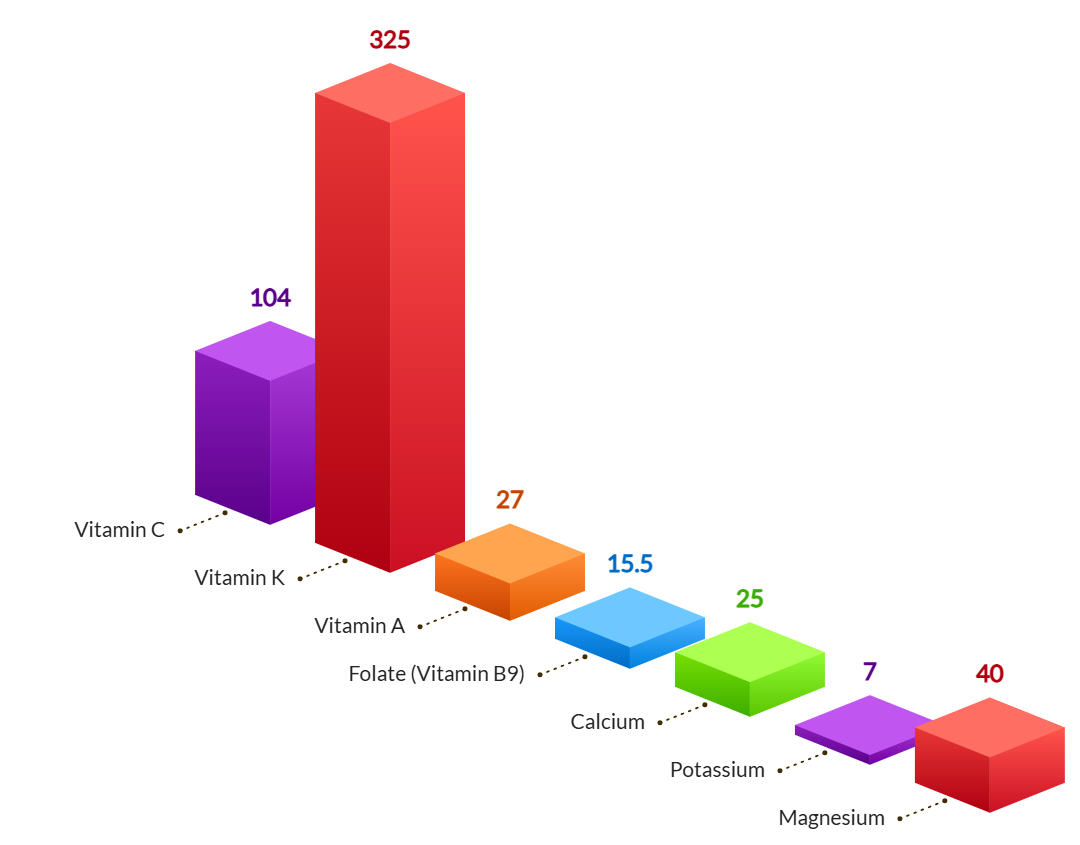Kale
Kale microgreens are a nutrient-packed superfood that offers numerous health benefits in a small, flavorful package. These young seedlings of kale are harvested just after sprouting, providing a concentrated source of essential vitamins, minerals, and antioxidants. Below is a detailed exploration of why kale microgreens are an excellent addition to your diet.
Nutritional Profile of Kale Microgreens
Kale microgreens are rich in vitamins A, B-complex (B2, B6, and folate), C, E, and K. They also contain vital minerals such as calcium, iron, potassium, manganese, and magnesium. These nutrients are essential for various bodily functions and promote overall health.

Nutritional Content of Kale Microgreens per 100g
Kale is a popular "superfood" because of it's potent nutritional benefits. Check out the percent of daily dietary requirements satisfied by a 100g serving of Kale.

Kale microgreens also contain antioxidants like lutein and zeaxanthin (104.33% DV), which help protect cells from oxidative stress and support eye health.
Health Benefits of Kale Microgreens
1. Bone Health
Kale microgreens are exceptionally high in vitamin K (390 mcg per 100g), which plays a critical role in bone mineralization and reducing the risk of fractures. They also provide calcium (254 mg) and manganese (0.92 mg), both essential for strong bones.
2. Immune System Support
Packed with vitamin C (93.4 mg) and vitamin A (241 mcg), kale microgreens boost immunity by supporting white blood cell production and maintaining healthy skin barriers against pathogens.
3. Eye Health
The high levels of lutein and zeaxanthin (6260 mcg) in kale microgreens protect against age-related macular degeneration and harmful blue light exposure.
4. Heart Health
The potassium content (348 mg) helps regulate blood pressure, while antioxidants like flavonoids reduce inflammation and lower cholesterol levels, promoting cardiovascular health.
5. Digestive Health
With moderate dietary fiber content (4.1 g per 100g), kale microgreens support healthy digestion by promoting regular bowel movements and gut health.
6. Anti-Inflammatory Properties
Kale microgreens contain carotenoids and flavonoids with anti-inflammatory effects that may reduce the risk of chronic diseases like heart disease, diabetes, and cancer.
7. Skin Health
Vitamin C enhances collagen production for skin elasticity, while vitamin E provides antioxidant protection against skin damage caused by free radicals.
Comparison to Mature Kale
Kale microgreens often contain higher concentrations of nutrients compared to mature kale:
Up to 40 times more nutrients in some cases.
Significantly higher levels of vitamin K, vitamin C, lutein, and beta-carotene.
This makes them an efficient way to consume essential nutrients without eating large quantities of mature vegetables.
Conclusion
Kale microgreens are not only nutrient-dense but also versatile in the kitchen. Whether you’re adding them to smoothies, salads, or savory dishes like tarts or pesto, they bring both flavor and nutrition to your meals!